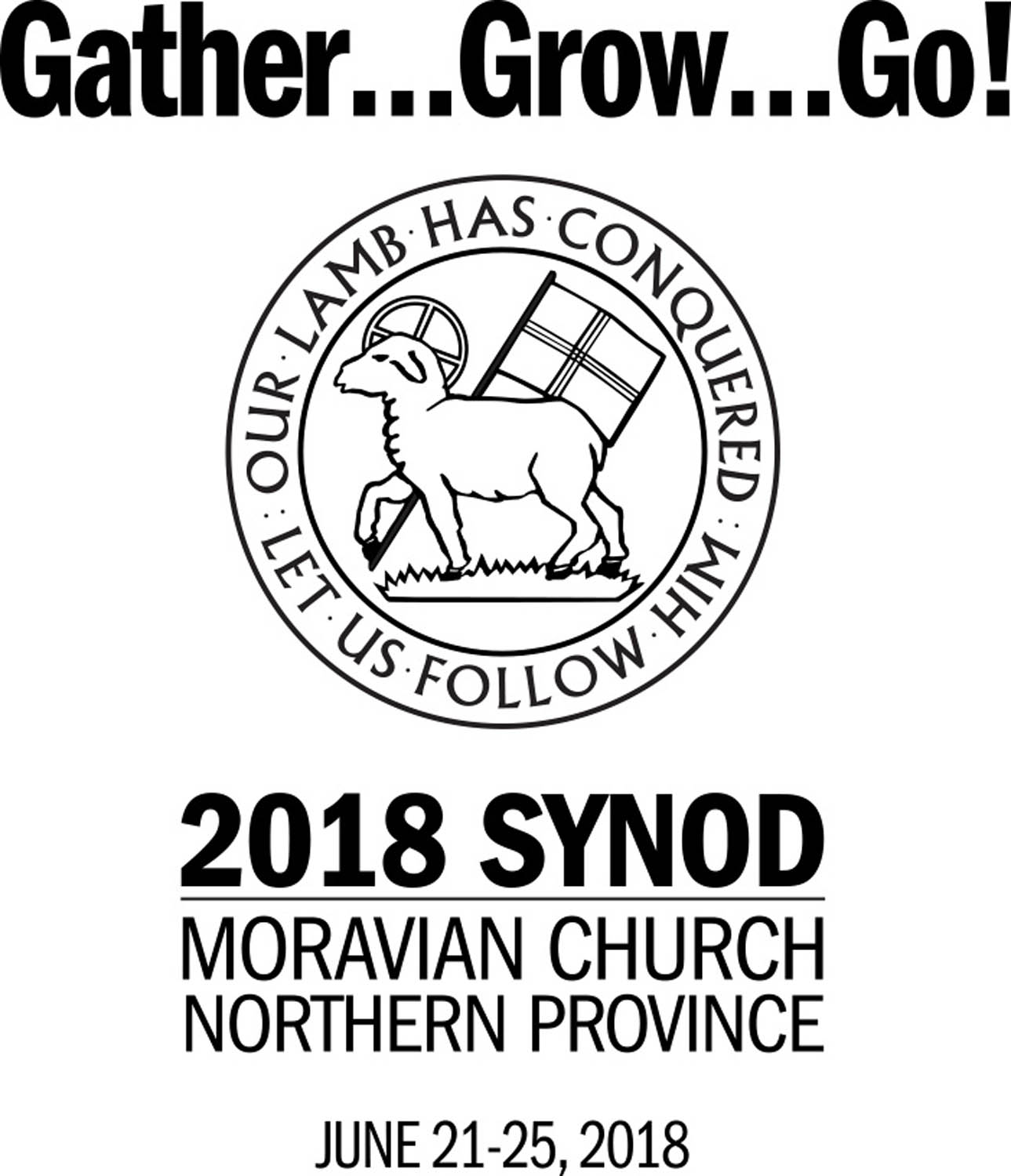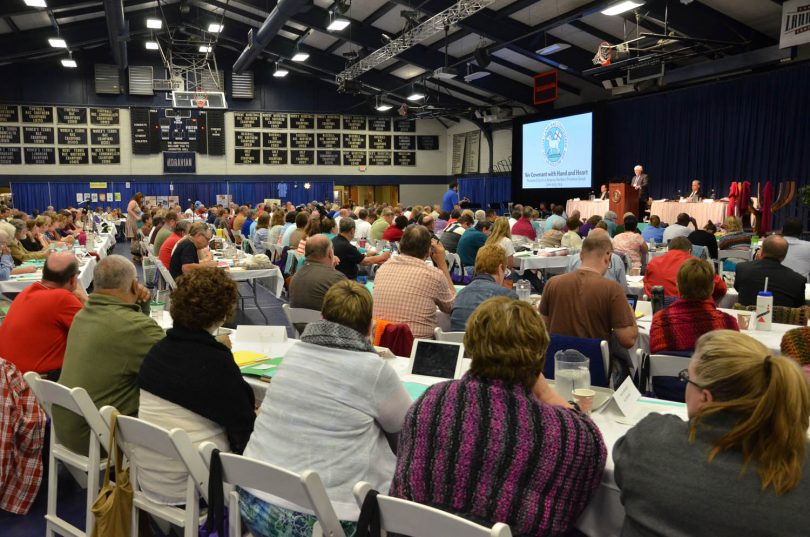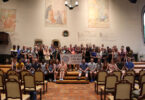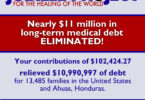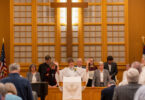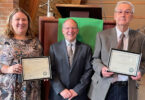Every four years, Moravians from each North American Province gather to “do the business of the church”—to decide, legislate, make policy, discuss doctrine, and chart the way forward for the next four years. In April, Southern Province Moravians convened in Black Mountain, N.C. for their Synod (see stories beginning on page 7).
Now it’s the Northern Province’s turn. In June, more than 260 delegates from across the Northern Province will meet in Bethlehem, Pa., to discern and make decisions on a wide range of topics facing the church today. The 2018 Synod of the Moravian Church in America, Northern Province, will be held June 21-24 at Moravian College.
The 2018 Northern Province Synod follows the theme “Gather… Grow… Go!” “We will gather humbly to discern God’s leading and acknowledge our place in God’s world; grow in our faith and relationships with God and each other, and our understanding of God’s call in our common life; and then go to live out the mission of our church,” says Betsy Miller, president of the Provincial Elders’ Conference (PEC) of the Northern Province.
Governing body of the Church
In the governance of the Moravian Church, Northern Province, the every-four-year-Synod is the “highest judicatory in the Province with supreme legislative powers in all matters not committed to by the Unity Synod.” In other words, Synod is where the key decisions about the Northern Province are made.
“Synod helps us discover God’s leading for the church,” says Betsy. “Our time together gives God an opportunity to speak to us and through us, and for us to listen to God and one another in discerning the future direction of the church.”
Congregational church councils elect delegates to Synod; each congregation can send one lay member for every 250 confirmed communicant members (or fraction thereof). All Northern Province clergy under call or appointment are named delegates, as are members of the PEC and the Eastern, Western and Canadian District Executive Boards. Six retired pastors are elected as delegates from the more than 60 eligible. Two youth delegates selected from each district also attend.
Unlike delegates to a government legislative session, however, Synod delegates are not given a mandate to vote a certain way or “represent” the views of their congregation. All delegates should be open to how the Holy Spirit guides them and not be beholden to opinions coming in to Synod.
Major topics at Synod
The 2018 Synod will feature discussion and decisions on a broad range of topics. One of the central areas of discussion will be the Province’s ongoing Identity, Purpose and Organization (IPO) work. Based on resolutions to the 2010 and 2014 Synods to study the structure of the Northern Province and develop new ways of administering the work of the province, several teams have researched and discerned who we are as a church, what we’re here to do, and how we will organize ourselves to do it.
During the 2018 Synod, delegates will review and evaluate proposals that envision a new structure for the Province. The proposed changes, which were shared with Synod delegates in pre-synod meetings throughout 2017, are designed to change how the Province and its districts work together, with greater collaboration, streamlined decision making, better resource sharing and an expansion of the ability to envision—and implement—a solid future for the church. “Our proposal seeks to leverage provincial unity while maintaining regional identity,” said Miller.
Additional topics for the Northern Province Synod include changes to the provincial pension program; a full communion relationship with the United Methodist Church; clergy care; spiritual companioning; healthy congregations; part-time clergy; lay leadership and more.
Along with addressing topics of concern to the church, a key duty of Synod is to elect church leadership for the coming four years. The Provincial Synod elects the Provincial Elders’ Conference and its president, along with representatives to boards of Northern Province agencies and interprovincial entities. It is also possible for Synod to elect bishops.
How Synod works
Synod actions originate in a variety of ways. Sometimes a single individual who feels strongly about an issue prepares a proposal for Synod consideration. Sometimes a congregational board or a district or provincial committee prepares a proposal or requests that Synod acts. Sometimes a Synod committee itself, after discussing issues that members place on its agenda, proposes action for Synod to consider.
To help address all of these issues, each delegate to Synod will be working within one of 13 committees. Synod committees give in-depth consideration to areas of special concern to the larger church in a setting that allows for prayer and seeking God’s direction and blessing in their area of focus on behalf of the larger Province.
However a proposal originates, at Synod it is referred to the appropriate committee for consideration. The committee discusses the proposal, edits it to its liking, and votes on whether to submit it to the whole Synod as a committee report. The report is debated, perhaps amended, and ultimately approved or defeated by a vote of the Synod. If approved by the entire Synod, it becomes a Synod directive, to be carried out as the report itself states.
A time of fellowship, worship and fun
While delegates to Synod should expect long days and hard work—after all, Synod is a time to do the work of the Province—they can also expect to have a fun, faith-filled experience and great fellowship.
Synod brings together Moravians from many parts of the U.S. and Canada. Delegates get to meet new people and renew old friendships. Each day of Synod includes spirited (and spiritual) worship and music. Activities and meals offer opportunities to relax, learn and celebrate being Moravian. There’s a sense of common purpose, where everything one does during their time at Synod is to guide the Northern Province to live faithfully into the future.
The Moravian Magazine will cover the 2018 Northern Province Synod, scheduled for June 21-25, 2018 at Moravian College in Bethlehem.
